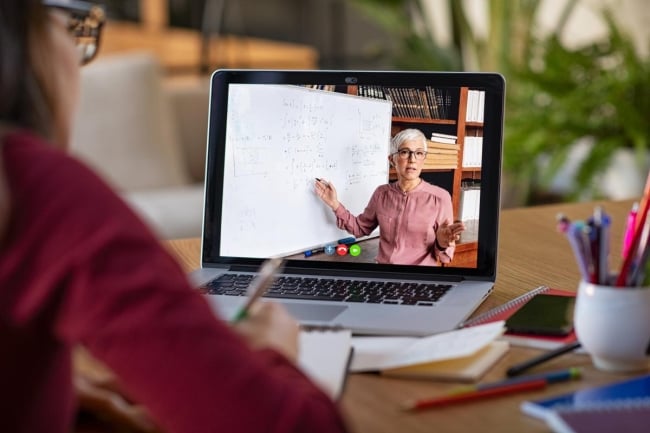You have /5 articles left.
Sign up for a free account or log in.

Istock.com/ridofranz
In the wake of the COVID-19 pandemic, many instructors with little or no remote teaching experience were forced to move their classes online.
Given scant guidance or time to prepare, this large-scale experiment in remote instruction wasn't destined for success. While some faculty members embraced the opportunity to try out new teaching methods, many understandably struggled to adapt rapidly to new tools and new ways of communicating with students.
As institutions prepare for the potential of another semester taught fully or at least partially online, there seems to be a widespread desire among college leaders to turn things around. Several surveys conducted during the spring semester indicated widespread dissatisfaction among students with the remote learning experience they received (see here, here, here and here) -- no institution wants there to be a repeat this fall.
Demand for resources and training to support faculty and deliver quality online instruction is at an all-time high, says Angela Gunder, vice president of learning at the nonprofit Online Learning Consortium.
“Our phones are ringing off the hook,” said Gunder. Membership inquiries are way up, and the organization is in talks with many institutions, systems and companies to deliver training in best practices for online instruction.
“We hate the circumstances, but we are humbled to be a position where we can accommodate the needs of so many,” said Gunder.
With a mission to promote quality online instruction, the OLC is striving to make many resources free so that the group's expertise can be accessed by everyone, regardless of their budget. “We’re in continuous conversation with our stakeholders to ensure we are providing adequate access. We strive to lead with empathy while still figuring out how to pay our bills,” said Gunder.
The OLC recently secured a grant from the Alfred P. Sloan Foundation, which will be used to provide professional development scholarships to faculty at minority-serving institutions. The OLC was originally funded by the Alfred P. Sloan Foundation and was known as the Sloan Consortium until 2014.
One of the companies the OLC has recently partnered with is McGraw-Hill Education, a textbook and digital courseware publisher. This week the OLC began delivering "train the trainer"-style workshops to an initial group of 30 faculty consultants working for the company.
Robin Lucas, senior director of marketing at McGraw-Hill Education, said demand for the OLC workshop was exceptionally high, even though McGraw-Hill's faculty consultants already have experience teaching online and working with digital tools.
The workshop will offer around 20 hours of training and is designed to be collaborative, said Lucas. Faculty members who complete the program will be awarded a certification from the OLC and encouraged to share their expertise with colleagues. Some McGraw-Hill Education staff have also asked to participate in the training so they can better understand best practices in online instruction.
The training isn’t specific to McGraw-Hill products but supports the company’s focus on learning science, said Lucas. “We didn’t want the program to be about McGraw-Hill products,” she said. “It’s about the best way to design online courses and approach online instruction.”
Many education publishers are offering a mixture of generalized resources on online education, in addition to specific guidance on how to best implement their own products. Both Pearson and Cengage, for example, are offering extensive written materials, webinars, and one-on-one training to faculty to help support them through this transition.
The OLC recently published a free comprehensive playbook on how to move courses online in cooperation with Every Learner Everywhere, a network of higher education organizations supported by the Bill & Melinda Gates Foundation.
Alison Pendergast, senior program officer at the Gates Foundation, said promoting quality teaching and learning is always a priority for the foundation, but there is new urgency to ensure vulnerable students aren’t “pushed off track” by the impact of the pandemic.
“We have no way of knowing what the future holds. There are at least three scenarios emerging for the fall semester. They may continue teaching online, they may teach online to some degree or they [may] largely teach on campus under certain conditions,” said Pendergast.
Regardless of what happens in the fall, all instructors would benefit from planning a multimodal delivery. “Face-to-face instruction supplemented by high-quality online courseware can accelerate students’ ability to engage with the curriculum. Active learning can have huge benefits,” said Pendergast.
“If I were preparing for the fall semester, I’d be taking this opportunity to rethink some of my teaching practice -- now is the time to do it. Providers are providing a lot of training, a lot of resources. People are eager to help faculty develop these skills,” said Pendergast. “Some of the changes may not be as hard to implement as you think.”
For faculty members looking for some extra support, the Every Learner Everywhere network is planning to offer free 30-minute one-on-one coaching sessions at the end of June. The concept is similar to the Instructional Design Emergency Response Network, established by instructional designer Diann Maurer. Maurer told EdSurge in March that hundreds of instructional designers had already stepped up to volunteer their time.
“The reason I am trying to reach out to faculty in my spare time [to support] other instructors who have never taught online is because I know the people who ultimately are going to suffer are the students,” said Maurer in her EdSurge interview.
Instructional designers are in high demand right now. The University of Waterloo, a public research university in Canada, for example, is currently looking to hire 11 instructional designers on one-year contracts. But not every institution has access to this expertise, and that is why free training resources are so valuable, said Pendergast.
“It is always a challenge to meet faculty where they are, but we hope the organizations we partner with will amplify the resources we make available,” said Pendergast.




